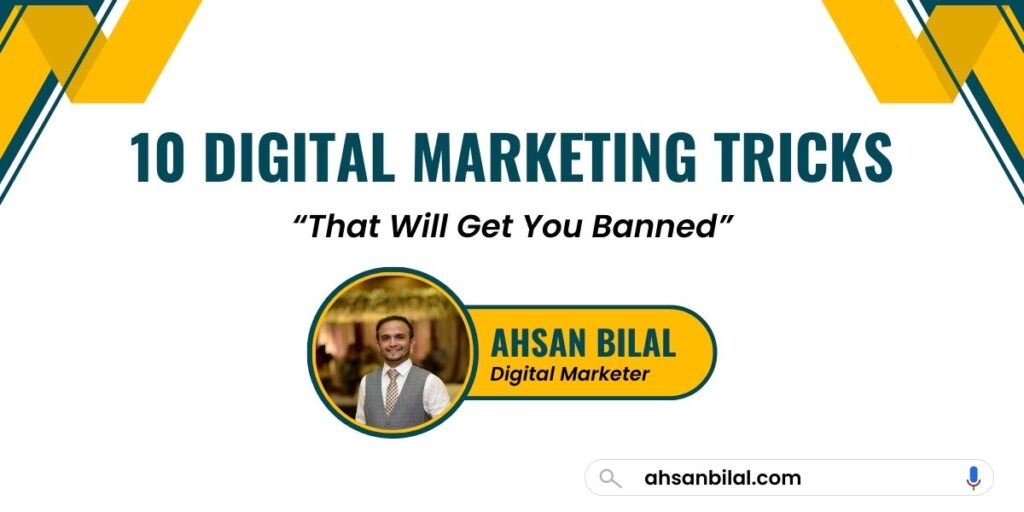In the fast-paced world of digital marketing, everyone is looking for an edge. The pressure to stay ahead can tempt marketers to adopt questionable tactics. While some strategies might offer short-term gains, they can also lead to severe consequences, including getting banned from platforms like Google, Facebook, and other essential digital arenas. Here, we explore ten digital marketing tricks that could get you banned, emphasizing the importance of playing by the rules.
1. Keyword Stuffing
Keyword stuffing is an outdated SEO tactic that involves overloading a webpage with keywords to manipulate search engine rankings. While it might have worked in the early days of SEO, search engines like Google now penalize this practice. Excessive keyword use disrupts the user experience and can lead to lower rankings or even a complete ban from search results.
2. Cloaking
Cloaking is a misleading method where the substance introduced to web search tools contrasts based on what is displayed to clients. This practice violates search engine guidelines because it misleads both the algorithm and users. Search engines prioritize transparency and relevant content, and cloaking can result in severe penalties, including delisting from search results.
3. Buying Followers and Engagement
Purchasing followers, likes, or comments to boost social media presence may seem like an easy way to gain traction. However, social platforms like Instagram, Twitter, and Facebook actively crack down on such activities. These fake engagements are often detected and can lead to account suspensions or bans. Authenticity is key to sustainable growth and engagement.
4. Creating Duplicate Content
Duplicate content involves copying and republishing substantial portions of text from one page to another. This can occur within a single website or across multiple sites. Search engines aim to provide users with unique and valuable content; thus, duplicating content can result in penalties. Instead, focus on creating original, high-quality content that provides value to your audience.
5. Using Link Farms
Link farms are networks of websites created solely for the purpose of link building to manipulate search engine rankings. Search engines like Google consider this a black hat SEO technique and penalize websites involved in such practices. Building high-quality backlinks through genuine partnerships and content marketing is a safer and more effective strategy.
6. Clickbait Titles with Misleading Content
Clickbait titles are designed to attract attention and entice users to click on a link, often leading to content that doesn’t deliver on the promise of the headline. This can result in high bounce rates and damage your site’s credibility. Platforms like Facebook penalize clickbait by reducing the visibility of such posts. Always ensure your content accurately reflects the title and provides value to the reader.
7. Automated Content Generation
Automated content generation involves using software to create large volumes of low-quality content quickly. While this might temporarily boost your content output, search engines prioritize high-quality, human-generated content. Automated content often lacks depth and relevance, leading to penalties. Focus on crafting well-researched, engaging articles instead.
8. Misleading Advertisements
Creating ads that make false claims or mislead consumers can lead to serious repercussions. Platforms like Google and Facebook have strict advertising policies, and violations can result in account suspensions or bans. Always ensure your advertisements are honest, clear, and comply with platform guidelines.
9. Hiding Negative Reviews
Some businesses may be tempted to hide or delete negative reviews to maintain a positive online reputation. However, review platforms like Yelp and Google My Business frown upon this practice. Transparency and addressing negative feedback constructively can enhance your credibility and customer trust.
10. Abusing Structured Data
Structured data helps search engines understand the content of your pages better and can enhance your search presence with rich snippets. However, misusing structured data to provide misleading information can lead to penalties. Ensure that your structured data accurately represents the content on your pages.
Conclusion
While it might be tempting to use these questionable tactics for quick wins, the risks far outweigh the rewards. Sustainable digital marketing success relies on ethical practices, providing genuine value to your audience, and adhering to platform guidelines. By avoiding these ten tricks, you can build a strong, credible online presence that stands the test of time.
